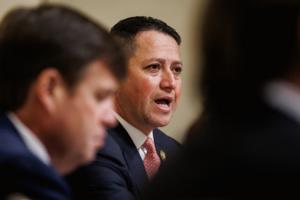Politics
/ArcaMax

New Democrat's entrance in race sets up Aspen-centric primary in U.S. Rep. Jeff Hurd's district
The entry this week of an Aspen-area Democrat in the primary to represent vast swaths of Colorado in the U.S. House of Representatives sets up a race between two businessmen from the Roaring Fork Valley.
Dwayne Romero on Tuesday announced his candidacy for Colorado’s 3rd Congressional District — which covers western and southern Colorado, ...Read more
Pentagon to cancel military fellowships at Carnegie Mellon
PITTSBURGH — The Pentagon will cancel senior service college fellowships at Carnegie Mellon University and 21 other institutions, citing concerns with perceived bias at these schools.
Five military students will be impacted at CMU, according to a memo sent by Defense Secretary Pete Hegseth late last week.
Other institutions cut off include ...Read more

Will Michigan opt into Trump's school choice program? Whitmer hasn't decided
TROY, Mich. — Gov. Gretchen Whitmer said Wednesday she would need more information before deciding whether Michigan would join at least 23 other states in opting in to a federal scholarship program giving taxpayers up to $1,700 for private school tuition or other educational uses.
The Democrat governor said President Donald Trump's Education ...Read more
Gov. Tim Walz and Keith Ellison spar with congressional Republicans over Minnesota's fraud response
Republicans in Congress grilled Gov. Tim Walz and Attorney General Keith Ellison about fraud in Minnesota on Wednesday, accusing the two officials of failed leadership, while Democrats decried the Trump administration’s chaotic and at times violent immigration crackdown in the state.
Walz and Ellison appeared on Capitol Hill for an hours-long...Read more

Bobby Pulido scores Texas congressional primary win, secures spot in November election
Tejano singer Bobby Pulido’s political dreams live to see another round after securing the Democratic nomination for Texas’ 15th congressional district on Tuesday night.
The “Desvelado” artist garnered over two-thirds of the primary votes in his home district to beat out emergency physician Ada Cuellar.
Tuesday night’s elections were...Read more

House Ethics panel launches probe of Rep. Tony Gonzales
WASHINGTON — The House Ethics Committee announced Wednesday it would investigate Texas Republican Rep. Tony Gonzales, who is facing sexual misconduct allegations and intense public scrutiny over how he treated a former staffer who later died by suicide.
The committee voted to establish an investigative subcommittee, announcing it would also ...Read more

Colorado Democrats blast Gov. Jared Polis as he again hints at intervening in Tina Peters' prison sentence
DENVER — Colorado Gov. Jared Polis has again signaled that he thinks Tina Peters’ prison sentence was too harsh as he considers granting some form of clemency — though not a full pardon, his office confirmed Wednesday.
In a social media post Tuesday night, Polis — who has also faced months of pressure from President Donald Trump to ...Read more

In Texas, Crenshaw's defeat headlines some tough blows for House incumbents
WASHINGTON — The power of incumbency came up short for some House members from Texas on Tuesday night, with Rep. Daniel Crenshaw losing a primary and others forced into May runoffs.
Crenshaw, a four-term Republican, lost by double digits to Steve Toth, a hard-right state lawmaker who had the backing of the House Freedom Caucus and Sen. Ted ...Read more

Congress once fought to limit a president’s war powers − more than 50 years later, its successors are less willing to assert their authority
Article 1 of the U.S. Constitution gives Congress the power to declare war, not the president. But most modern presidents and their legal counsel have asserted that Article 2 of the Constitution allows the president to use the military in certain situations without prior congressional approval – and have acted on that, sending troops into ...Read more

Commentary: Donald Trump's tariff refund game to deny, delay and defy the Supreme Court
The Supreme Court ruled 6-3 that the $164.7 billion in tariffs collected under the International Emergency Economic Powers Act (IEEPA) was unlawful. In a constitutional system governed by judicial supremacy, such a decision should have marked the end of the matter. Instead, it has triggered a historic act of executive defiance.
Despite the ...Read more

What to watch from Trump's national AI standard
WASHINGTON — President Donald Trump’s executive order on artificial intelligence promised a proposal to Congress for a national artificial intelligence law, one meant to unify U.S. policy and address industry fears that conflicting state laws could slow AI growth.
More than two months later, the White House has offered few specifics on what...Read more

DHS Secretary Kristi Noem declines to address Marimar Martinez, tells Senate panel she's 'not familiar' with her shooting
With Marimar Martinez standing a few rows behind her, Department of Homeland Security Secretary Kristi Noem testified before the Senate Judiciary Committee in Washington on Tuesday that she was not “familiar with the details” of Martinez’s shooting by an immigration agent in Chicago last fall and unaware whether the agent who shot her was ...Read more

What the Supreme Court ruling on gender identity means for students, parents and schools
The Supreme Court’s ruling Monday affirming the right of parents to know about their child’s gender identity at school has left California educators with complicated questions about how to protect the sometimes competing rights of students, school employees and family members.
The Supreme Court decision in Mirabelli v. Bonta, while falling ...Read more

Senate Republicans join Democrats in grilling Noem over ICE shooting deaths
WASHINGTON — Homeland Security Secretary Kristi Noem arrived at a Senate oversight hearing Tuesday ready to spar with Democrats in her first Capitol Hill appearance since federal agents fatally shot U.S. citizens Alex Pretti and Renee Good in Minneapolis.
But some of the sharpest comments from the Judiciary Committee came from fellow ...Read more

Tim Walz, Keith Ellison testify on Minnesota fraud before U.S. House panel Wednesday
Gov. Tim Walz and Attorney General Keith Ellison are set to testify before a Congressional committee Wednesday morning in a hearing focused on allegations of widespread fraud in Minnesota government programs.
The state leaders are expected to answer questions from the Republican-led House Oversight and Government Reform Committee, which ramped ...Read more

CIA agents successfully executed a plan for regime change in Iran in 1953 – but Trump hasn’t revealed any signs of a plan
When the bombing of Iran began on Feb. 28, 2026, the Trump administration had not informed the American people exactly what it was prepared to achieve.
Was the attack intended to degrade Iran’s nuclear program? Trump had declared that “obliterated” after last June’s bombing.
Was it to slow Iran’s ballistic missile ...Read more

At Senate hearing, Noem refuses to apologize for calling Pretti and Good domestic terrorists
Department of Homeland Security Secretary Kristi Noem refused to apologize for calling two Minnesotans domestic terrorists after they were shot and killed by federal agents during Operation Metro Surge.
Those comments became a central focus of more than four hours of questioning in front of the Senate Judiciary Committee on Tuesday, March 3. ...Read more

Sen. Padilla preps for Trump trying to seize control of elections via emergency order
Sen. Alex Padilla, D-Calif., is preparing for President Trump to declare a national emergency in order to seize control of this year's midterm elections from the states, including by bracing his Senate colleagues for a vote in which they would be forced to either co-sign on the power grab or resist it.
In the wake of reporting last week that ...Read more

William & Mary on Pentagon's list of 'toxic indoctrination' colleges, losing its support
WILLIAMSBURG, Va. — William & Mary has joined a growing list of universities that have been rebuked by military leadership in a recent Pentagon effort to divert federal resources from institutions deemed “woke” and “anti-American.”
After saying in mid-February it was cutting ties with Harvard University, the Pentagon announced Friday ...Read more

South Carolina Rep. Nancy Mace pushes back on allegations she profited from House reimbursement program
U.S. Rep. Nancy Mace, who is running for the Republican nomination for governor in South Carolina, is criticizing an investigation that accused her of profiting from a program meant for helping federal lawmakers offset living expenses.
The House Ethics Committee voted 6-0 to further review allegations against Mace for allegedly engaging in ...Read more
Popular Stories
- Trump denies Israel forced US to join war against Iran
- Public defender shortage is leading to hundreds of criminal cases being dismissed
- Trump Media's financial report revives questions for investors
- DHS Secretary Kristi Noem declines to address Marimar Martinez, tells Senate panel she's 'not familiar' with her shooting
- Senate Republicans join Democrats in grilling Noem over ICE shooting deaths




















































